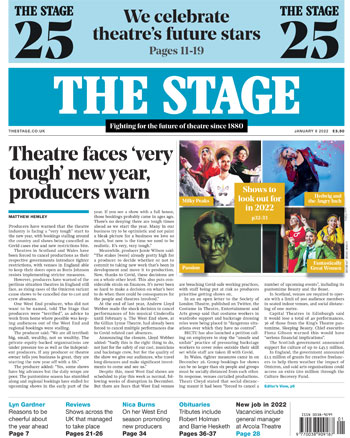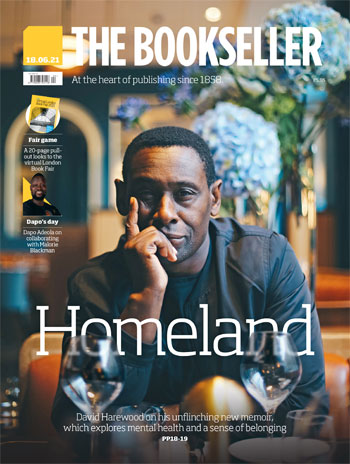
Sitting tight when times get tough sounds tempting. And with theatres closed during the early peaks of the pandemic, for theatreland’s bible, The Stage, things have been especially hard. Yet a holding pattern was the last thing on anyone’s mind at The Stage Media Company. So the company acquired The Bookseller. Then it launched Future of Theatre – a three-day conference recently named PPA Independent Publisher Awards 2021 Event of the Year.
“You’ve got to evolve, all of the time,” says Hugh Comerford, the company’s managing director. “We saw changes already happening accelerate. We saw shifts we weren’t sure would stay, and other changes now likely to last. We learned lessons, faster.”
A family concern
Established in 1880, The Stage is a weekly entertainment industry newspaper centred on theatre. It is run by a private limited company still owned by the family of one of its founders, Maurice Comerford. Hugh Comerford is Maurice Comerford’s great grandson.

An essential resource for actors and performers, backstage workers, creative teams and those in training and education, it has recently evolved into a true, multimedia brand with a website, mobile app, podcast, awards, email job alert, online archive, and Love Arts – a dating site – all part of the portfolio.
Today, the title claims a digital and paid readership (including pass-on) of around 30,000. This is a similar level to that of The Bookseller –launched in 1858 – which became part of The Stage Media Company six months into the pandemic, in August 2020.
“It made total sense to bring the two titles together as they are in different markets, both comment on and are part of the industry they serve, address industry changes and put on industry events, and both are broadening their range of offerings and doing better things,” Comerford explains.
We thought we’d have an enormous amount of things in common, and so it’s been.
A good match
“We thought we’d have an enormous amount of things in common, and so it’s been.”
Over and beyond the ability to share common services and best practice, the strategic fit has worked well. For example, the Bookseller has “an admirable get up and go spirit”, he says, from which The Stage has developed “an element of urgency”.

“Sharing costs is an obvious benefit – you don’t need two finance directors, or two MDs. We’ve merged sales and marketing to give people broader exposure and encourage best practice, though the two editorial teams are and will remain completely separate,” he adds.
Soon, The Bookseller will move to the unified business platform The Stage recently migrated onto, as well.
“In terms of costs, it’s a bit of a no-brainer,” he admits.
“But it’s really about looking at things that have worked on one side and asking: why don’t we try that on the other? On the books side, there are events such as FutureBook, so a Future of Theatre event was not a million miles from that.”
Further, future-gazing events such as these also generate kernels of other ideas that in coming years may become stand-alone events in their own right.
Pre-pandemic, The Stage’s direction of travel was similar to that of many business-to-business publishers – away from print, towards digital.
“Print has been remarkably robust across The Stage and The Bookseller – though for both, more people now buy digital. Vast numbers of people not regular readers of either have heard of or are interested in each – partly because of the subject, partly because there is something iconic about print that helps you be visible,” he says.
Both titles’ websites currently attract between 350,000 and 400,000 unique visits each month.
“Like many publishers, the complete dependence on advertising we once had has reduced over the years. Across both, we are probably now looking at a revenue split of around 45% advertising, 40% revenue from readers and the remainder from things like events and licensing,” Comerford continues.
Digital subscriptions for each are growing well, he adds, with print now accounting for one quarter to one third of subscription revenues. The websites provide an important platform for a growing array of products and services, too. And advertising – recruitment advertising, especially – also work well there.
In times of crisis, you either become more important or less important. Nothing simply stays the same.
Response to pandemic
Over and above everything, quality editorial is the main driver of growth for both titles. Which was why, when Covid-19 struck, the company remained committed to investing in editorial throughout.
“We were knocked sideways by an overnight drop in recruitment advertising – down 80% in just two or three weeks,” he recalls. “As that was then our biggest source of revenue, it was a terrible thing to deal with.”
Working in the company’s favour, however, were some timely pre-pandemic IT upgrades – which made remote working relatively straightforward; the support of a number of suppliers, who temporarily cut their charges; and its owners’ long-standing belief in the importance of the company being well-capitalised.
In addition, the company restructured following consultation during the early months of the pandemic, which led to introducing pay restraint and cutting back its sales team while advertising was down, while at the same time maintaining investment to support editorial content and standards.
“All of this meant we could keep going. And we saw an increase in subscriptions – in part as people who, maybe, shared a copy in the office, wanted their own copy working at home. It all certainly proved the case that if you have the right editorial, you become more important in a time of crisis,” Comerford concludes.
Another circulation boost came around the time of the company’s restructuring when, in a report on the pandemic’s impact on theatre on Radio 4’s World at One, Vanessa Redgrave declared her love for The Stage and her fear the pandemic might force it to close.
An important shift in coverage as a result of the pandemic now looks set not only to stay, but also to shape strategy moving forward, Comerford reveals.
“We decided early on we wanted The Stage to support the industry by being the meeting place for people given they weren’t going to work – the place to find out what was going on, when there was no other way. You can’t write about Covid forever. So we became more of a campaigning title,” he explains.
“People like Sir Andrew Lloyd Webber were being extraordinarily effective and dynamic in the industry, and The Stage was saying some very similar things, and that made a real difference to people. In times of crisis, you either become more important or less important. Nothing simply stays the same.”
As it’s been for all publishers, it was a tough period, but lessons learned include understanding the value of tough decisions, identifying which changes will be temporary and which should be permanent, and striking the right balance between the two.
“As a result,” Comerford notes, “I believe we are now in a stronger position.”
By which, he means nimbler and more agile, closer to its industry thanks to a more openly campaigning stance, and more willing to try something new.
“What has become more overt is the need to be first with the news and to have really good content, which we already knew. But a number of other things came out of it, too,” he says.
“We thought more closely about what we want government to do to support the industry. We became more intimately aware of the issues the industry is trying to address. We got closer to the conversation, which is how Future of Theatre came about.”
It’s about what’s next, what’s needed, what’s missing from the market, then trying things out and seeing how they work.
Future plans
With its switch to a new unified business platform – a move planned pre-pandemic, then carried out in 2020 despite it – The Stage is getting closer to its readers, too.
“The move gives us much more insight into our readers, who they are, their reading habits, what they are interested in, the kind of engagement they already have with you, and the journey they go on – all things you need to know if you are going to be more relevant,” he says.
And all these insights will help power the continual evolution the team believes in.

Events, he says, will be one direction of future travel.
Back in 2017, The Stage launched The Stage Debut Awards to recognise the best breakthrough writers, actors and creatives in the theatre, having run the more industry-focused The Stage Awards – marking UK and international theatrical achievement – since 2011.
Both have become especially important components in the brand’s portfolio over the past year, along with The Stage 100 – its annual ranking of the most influential people in theatre.
More events will follow, Comerford hints. Though an immediate priority for the company, as for so many others, will be mastering the complexities of how best to put on a hybrid – physical mixed with virtual, or online – event.
Data products will provide another focus.
“The ability to gather information about the people who interact with you – performers, playwrights, authors – in a way that you can retrieve this data and use it to offer different products designed to appeal to different groups is appealing,” he says.
“Publishing is well researched with good data available across many different publishing genres.
“In contrast, theatre is under-researched and there is a real opportunity there. Analysing the content we already have, understanding the additional information we can get from our audience, and marrying the two to create new products will be our next big development.
“It’s about what’s next, what’s needed, what’s missing from the market, then trying things out and seeing how they work.”
Other priorities include striking the right balance between flexible working practices – which pre-pandemic, Comerford believes, were long overdue – and the tangible benefits of some time each week spent working together in the same, physical space.
Also, developing more opportunities for publishers – independent publishers, especially – to collaborate on important issues.
“Costs are always a challenge. And it seems pretty likely we will be all paying more for paper this year,” Comerford adds.
“Meanwhile, the Royal Mail tends to put its prices up fairly regularly. The publishing world should probably work harder to work together more closely to cultivate different delivery networks and much needed competition for the Royal Mail.
“Helping each other where we can, and sharing ideas, has to be the way forward.”
This article was first published in InPublishing magazine. If you would like to be added to the free mailing list, please register here.










